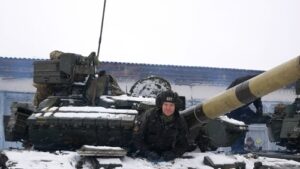The Strategic Shift in Russia’s Defense Budget: Analyzing Putin’s Military Spending and Its Implications

In what is perhaps one of the most significant geopolitical shifts of our time, Russia’s initial "special military operation" has escalated into a full-blown conflict, overshadowing international relations and stirring global tensions. As the situation unfolds, Russian President Vladimir Putin’s recent budgetary decisions underscore the extent to which the conflict is reshaping Russia’s economy and military strategy.
Record-Breaking Defense Spending
In a bold move, President Putin announced a new budget plan that allocates an eye-watering 32.5% of the total budget (approximately 13.5 trillion rubles) for defense spending in fiscal year 2025. This figure marks a significant increase from the 28.3% allocated in FY24, indicating that military expenditure is now accounting for 6.2% of Russia’s GDP. This isn’t just a short-term strategy; the budget process is designed to take into account military costs over the next three years, suggesting an enduring commitment to sustain military operations regardless of political changes both domestically and abroad.
Historically, Russia’s pre-war military spending was only 3.6 trillion rubles. In stark contrast, spending surged to 5.5 trillion rubles at the outbreak of the war, climbing further to 6.4 trillion rubles in 2023. Such a dramatic increase raises crucial questions: How will Russia finance its growing military needs, particularly as global tensions continue to rise?
Economic Forecasts Amidst War
The Kremlin is forecasting a GDP of 195.8 trillion rubles for 2024, up from 172.1 trillion rubles last year, with an optimistic projection of 214.6 trillion rubles for 2025. However, these figures may not adequately account for the continuous drain on resources due to the war. Russia finds itself in a delicate balancing act: maintaining economic health while devoting substantial funds to a military conflict.
In response to this financial strain, Putin has enacted his first tax increase in 25 years, raising the corporate tax rate by 5% from 20% to 25%. This move is expected to generate an additional 2.6 trillion rubles by 2025, targeting about 3.2% of the workforce. Interestingly, taxes on investments remain unchanged, as the government aims to craft a "fair and balanced tax system," according to Finance Minister Anton Siluanov. The government positions this adjustment as a pathway to bolster the nation’s "economic well-being" during turbulent times.
The Global Perspective
Despite escalating military expenditures, it’s essential to contextualize Russia’s defense spending within the broader landscape. Even currently, with the increased budget, Russia spends only about one-fourth of what the United States and China allocate for their military needs. The stark statistics reveal another layer of complexity—India, for example, has surpassed Russia in defense spending.
As we look towards the future, particularly the critical years of 2027 and 2028, there’s the potential for further increases in military budgets globally. The ongoing geopolitical tensions suggest that nations will need to reassess their military strategies and expenditures significantly.
Conclusion
As the landscape of global economics and politics continues to evolve, Russia’s defense spending strategy will be a key factor in determining not only the trajectory of the conflict in Ukraine but also the broader balance of power on the world stage. At Extreme Investor Network, we are dedicated to providing in-depth analysis and insights on these critical economic trends. Understand the implications of such developments, engage in meaningful discussions, and navigate the complexities of global investment with informed expertise.
Stay tuned for more updates from Extreme Investor Network, where we bring you the latest insights on economic shifts and investment strategies amid global change.

